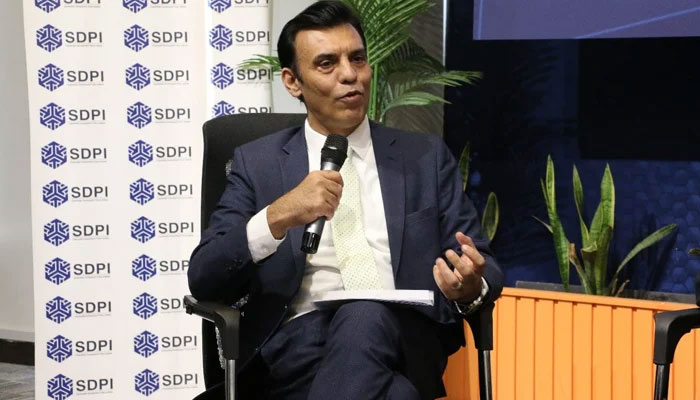Pak-China working group crucial for green energy transition
Islamabad: Dr Abid Qaiyum Suleri, Executive Director, Sustainable Development Policy Institute (SDPI), on Wednesday has said that Pakistan and China can collaborate for exploring the untapped potential of ‘Green Minerals’ under the China-Pakistan Economic Corridor (CPEC) as it is the future fuel of the world.
Dr Suleri was addressing high-level policy dialogue on "Reforms agenda for CPEC 2: opportunities and the way forward” under its Green CPEC Alliance jointly organised here by Sustainable Development Policy Institute (SDPI) and the Pakistan China Institute (PCI).
Dr Suleri said that the country needs to consider challenges along with opportunities as both have a common denominator of extreme weather and climate change across the region and the world.
The revised trade regime is another challenge after the implementation of Carbon Border Adjustment Mechanism (CBAM) by the European Union (EU) to report carbon emissions in the supply chain of its exports whereas US and China are working on it, he said.
Dr Suleri noted that there is a lack of indigenous infrastructure and capacity to document and gauge carbon emissions at every sector level. Going green means replacing conventional methods of production and businesses to offset carbon emissions. The increased tariff on China’s green energy transition technology due to the efficacy of these solutions is another challenge as the competing nations are increasing tariff on it to protect their local manufacturers, he said.
Green metals, he said are another important component including nickel, cobalt and lithium that will help in ElectroVoltaic batteries’ development that can be explored under CPEC 2. “Green diplomacy is another important tool that needs to be scaled up for borderless promotion of green technologies and transfer of technology,” Dr Suleri said.
Mustafa Hyder Sayed, Executive Director, PCI, said Pakistan needs policy coordination with clear reforms alongwith relevant bankable feasibility studies to succeed the second phase of CPEC. He said the country would have to realise and materialise fool proof security for the Chinese and it also needs to develop a joint working on green energy transition under the CPEC.
Mushahid Hussain Sayed, former Chairperson, Senate Defence Committee, in his video message said CPEC is the pillar of the BRI launched by President Xi Jinping which is undoubtedly the diplomatic and development initiative of the century encompassing Asia, Africa and beyond.
The BRI, he said, has brought nations of the world together, whereas CPEC is the manifestation of Chinese confidence in Pakistan as China came to help Pakistan at a critical stage when the country barely had any other nation’s support.
Dr Khalid Waleed from SDPI said Pakistan’s carbon emissions in energy sector are seven times more than EU that will create serious challenge for Pakistan, whereas reforms are required for greening the investment of CPEC alongwith establishment of renewable energy diplomatic task force.
Wang Shengjie, Head of Political and Press Section, Embassy of People’s Republic of China said that it is necessary for the stakeholders to understand the upgraded version of the CPEC, the guidance of the leadership of the two counties and synergising policies to achieve its successful completion.
-
 Kate Hudson Explains Why Acting Isn't Discussed At Home
Kate Hudson Explains Why Acting Isn't Discussed At Home -
 Prince William, Kate Middleton Epstein Statement Was AI Generated, Says Expert
Prince William, Kate Middleton Epstein Statement Was AI Generated, Says Expert -
 Sarah Ferguson On Her Way To Hurt 'only Two People Who Care About Her'
Sarah Ferguson On Her Way To Hurt 'only Two People Who Care About Her' -
 World’s Top PC Maker Sounds Alarm Over Memory Chip Shortage
World’s Top PC Maker Sounds Alarm Over Memory Chip Shortage -
 King Charles Is ‘clearly Worried’ Andrew Has Tarnished Royal Image
King Charles Is ‘clearly Worried’ Andrew Has Tarnished Royal Image -
 Royal Family Loses 'loyal' Worker After King Charles Disliked His Work?
Royal Family Loses 'loyal' Worker After King Charles Disliked His Work? -
 James Van Der Beek's Quiet Sacrifice Before Death Comes To Light
James Van Der Beek's Quiet Sacrifice Before Death Comes To Light -
 Suspect Kills Six Across Florida Before Taking His Own Life
Suspect Kills Six Across Florida Before Taking His Own Life -
 AI Helps Researchers Identify 2,000-year-old Roman Board Game Stone
AI Helps Researchers Identify 2,000-year-old Roman Board Game Stone -
 Inside Kate Middleton, Prince William’s Nightmare Facing Andrew Mountbatten-Windsor
Inside Kate Middleton, Prince William’s Nightmare Facing Andrew Mountbatten-Windsor -
 Margaret Qualley Shares Heartfelt Confession About Husband Jack Antonoff: 'My Person'
Margaret Qualley Shares Heartfelt Confession About Husband Jack Antonoff: 'My Person' -
 Savannah Guthrie Shares Sweet Childhood Video With Missing Mom Nancy: Watch
Savannah Guthrie Shares Sweet Childhood Video With Missing Mom Nancy: Watch -
 Over $1.5 Million Raised To Support Van Der Beek's Family
Over $1.5 Million Raised To Support Van Der Beek's Family -
 Paul Anthony Kelly Opens Up On 'nervousness' Of Playing JFK Jr.
Paul Anthony Kelly Opens Up On 'nervousness' Of Playing JFK Jr. -
 Diana Once Used Salad Dressing As A Weapon Against Charles: Inside Their Fight From A Staffers Eyes
Diana Once Used Salad Dressing As A Weapon Against Charles: Inside Their Fight From A Staffers Eyes -
 Video Of Brad Pitt, Tom Cruise 'fighting' Over Epstein Shocks Hollywood Fans
Video Of Brad Pitt, Tom Cruise 'fighting' Over Epstein Shocks Hollywood Fans




